Dealing with Heartbreak and Porn Addiction: What to Do
If you're struggling with a broken heart and a porn addiction, find out how to cope and move forward with these helpful tips and strategies.
6/8/20245 min read


Understanding the Intersection of Heartbreak and Porn Addiction
Heartbreak, a profoundly emotional experience, can significantly impact an individual's mental health and well-being. During such distressing times, people often seek solace in various forms of escapism, one of which may be pornography. This behavior can be attributed to the psychological mechanisms that come into play when individuals are dealing with emotional pain. The consumption of pornography triggers the release of dopamine, a neurotransmitter associated with pleasure and reward. This biochemical response may provide temporary relief from the intense feelings of sadness and loneliness that accompany heartbreak.
However, relying on pornography as a coping mechanism can lead to a complex interplay between emotional suffering and addictive behavior. The temporary escape offered by pornography does not address the underlying emotional distress but rather masks it, potentially leading to a cycle of dependency. As the individual continues to seek out pornography for comfort, the frequency and duration of use may increase, further entrenching the addictive behavior.
The consequences of using pornography to cope with heartbreak can be far-reaching. While the immediate effect may be a temporary sense of relief, it often exacerbates feelings of loneliness and depression in the long term. Engaging in this behavior may lead to social isolation, as individuals might withdraw from meaningful relationships and real-life interactions in favor of the artificial gratification offered by pornography. Additionally, the guilt and shame associated with excessive consumption can further deteriorate one's self-esteem and overall mental health.
Understanding the intersection of heartbreak and porn addiction is crucial for addressing the root causes of both issues. By acknowledging the psychological mechanisms at play and recognizing the potential negative consequences, individuals can take proactive steps towards healthier coping strategies. Seeking professional help, building a supportive social network, and engaging in activities that promote emotional healing are essential measures for overcoming the challenges posed by heartbreak and porn addiction.
Acknowledging and Accepting Your Situation
When dealing with the dual challenges of heartbreak and a porn addiction, the first and most critical step is to acknowledge and accept your situation. This process involves a profound level of self-awareness and honesty. Often, denial can serve as a significant barrier to progress, making it crucial to confront both issues head-on.
Heartbreak can be an emotionally overwhelming experience, often leading individuals to seek solace or distraction in various ways, such as through porn. Recognizing that you are heartbroken is essential, as it allows you to understand the driving forces behind your addiction. Similarly, admitting that you have a porn addiction is equally important, as it brings to light the need for addressing this behavior.
Self-reflection is a powerful tool in this journey. Take time to evaluate your emotions and behaviors. Journaling can be particularly beneficial, as it provides a space to freely express your thoughts and feelings without judgment. Reflect on the triggers that lead you to consume porn and how these moments correlate with your emotional state post-heartbreak. Identifying these patterns can help you better understand the root causes of your addiction.
Acceptance is not about self-judgment but rather about acknowledging reality. By accepting your situation, you create a foundation upon which you can build a recovery plan. This includes recognizing that seeking help is a sign of strength, not weakness. Consider reaching out to support groups or a mental health professional who specializes in addiction and emotional trauma. They can provide guidance and support tailored to your unique situation.
In summary, acknowledging and accepting both your heartbreak and porn addiction is the cornerstone of your recovery journey. It requires honesty, self-reflection, and a willingness to seek help. By taking these initial steps, you pave the way for healing and personal growth.
Developing Healthy Coping Mechanisms
When dealing with the dual challenge of heartbreak and a porn addiction, it is crucial to establish healthy coping mechanisms to replace the unhealthy habit of watching porn. Engaging in hobbies can be a productive outlet. Whether it is painting, playing a musical instrument, or gardening, hobbies not only divert attention but also provide a sense of accomplishment and joy.
Physical exercise is another powerful tool in managing emotional distress. Activities such as running, yoga, or even simple walking can significantly elevate mood by releasing endorphins, which are natural mood lifters. Regular physical activity also helps in reducing stress and anxiety levels, contributing to overall mental well-being.
Mindfulness practices, including meditation and deep-breathing exercises, can be incredibly effective in managing urges and emotional turmoil. Mindfulness helps in grounding oneself in the present moment, reducing the tendency to seek solace in unhealthy habits. Guided meditation apps or local mindfulness groups can be useful resources to start with.
Self-care should not be overlooked. Simple actions such as maintaining a balanced diet, getting adequate sleep, and ensuring proper hydration can have a substantial impact on emotional health. Engaging in activities that promote relaxation, like taking a warm bath or reading a good book, can also serve as effective stress relievers.
Establishing a routine can provide structure and a sense of normalcy during turbulent times. Setting small, achievable goals can foster a sense of progress and personal growth. Whether it is committing to a daily walk, setting aside time for a hobby, or practicing mindfulness, having a plan can make the journey towards emotional healing more manageable.
Incorporating these healthy coping mechanisms can aid in breaking the cycle of porn addiction and pave the way for recovery from heartbreak. By focusing on personal growth and self-care, one can gradually rebuild emotional resilience and move towards a healthier, more fulfilling life.
Monitoring Progress and Adjusting Strategies
Embarking on a journey of recovery from heartbreak and porn addiction requires a structured approach to monitor your progress and adjust strategies accordingly. Setting realistic goals is the initial step in this process. By breaking down your long-term objectives into smaller, attainable milestones, you make the recovery process less overwhelming and more manageable.
One effective method for tracking progress is maintaining a journal. Documenting your emotional and behavioral changes on a daily or weekly basis can provide valuable insights into your recovery journey. This practice not only helps in identifying patterns and triggers but also serves as a motivational tool when you look back and see how far you have come. Additionally, employing self-assessment tools, such as mood trackers or addiction recovery apps, can offer a more structured way to monitor your progress.
Flexibility is crucial in any recovery plan. As you progress, you may find that certain strategies are more effective than others. Regularly reviewing and adjusting your approach ensures that you remain responsive to your needs. For instance, if you find that mindfulness exercises are more beneficial than cognitive-behavioral techniques, it might be wise to allocate more time to these activities. It’s important to remain open to experimenting with different strategies and seeking professional advice when necessary.
Celebrating small victories plays a significant role in maintaining motivation. Acknowledging and rewarding yourself for even minor achievements can boost your morale and reinforce positive behaviors. Whether it's a week without engaging in addictive behaviors or successfully navigating a difficult emotional moment, each small victory is a step towards overall recovery.
Lastly, it is essential to understand that setbacks are a natural part of the recovery process. Rather than viewing them as failures, consider them learning opportunities. Reflecting on the circumstances that led to a setback can provide valuable insights and help you refine your strategies moving forward. Remember, the path to recovery is not linear, and each step, forward or backward, contributes to your growth.
© 2025 XFilter. All rights reserved.


